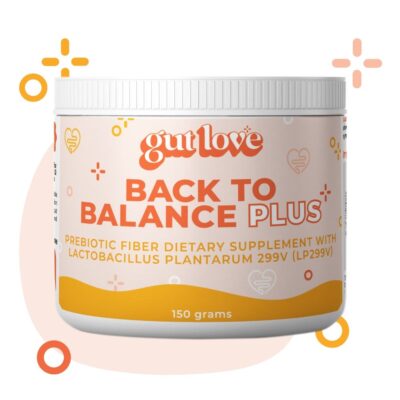Table of Contents
IBS and IBD: An Easy to Follow Breakdown
How can you tell the difference between IBS and IBD? In short, IBS refers to irritation while IBD (inflammatory bowel disease) refers to chronic inflammation of the bowel which can cause widespread effects in the body. However, some people get confused with the terminology and key distinctions between the two. Especially those with inflammatory bowel disease who may also have IBS symptoms alongside IBD symptoms. So let’s break it down further.
What is IBS?
Irritable bowel syndrome (IBS) is known as a functional gastrointestinal disorder. A functional gastrointestinal disorder means that there is some type of disturbance or irritation n bowel function. IBS affects 10-15% of adults in the US and tends to affect women more than men (3).
IBS can cause a lot of discomfort and symptoms can range in severity from mild to severe which can greatly impacting things like travel, eating out and socializing. However, those with IBS do not have the chronic and widespread inflammation that is common with an active disease state of IBD.
Unlike IBD, IBS can be diagnosed by symptoms alone. Having IBS symptoms for twelve weeks or more out of the year accompanied by change in stool pattern and frequency warrants and IBS diagnosis.
What are Symptoms of IBS?
Irritable bowel syndrome can vary in intensity from mild to severe when it comes to symptoms. Symptoms can be increased by food intolerances, hormones, medications, inadequate intake of plants, stress and more. IBS can cause irregular motility and nerve endings within the colon tend to be more sensitive or “irritable” as the name indicates. The sensitivity of the nerve endings can cause them to be more active or triggered.
- Gas
- Abdominal Bloating
- Fecal urgency
- Abdominal pain
- Constipation
- Diarrhea
- Alternating constipation and diarrhea
- Occasionally mucus in the stool or nausea
What is IBD?
Inflammatory Bowel Disease (IBD) refers to a group of diseases characterized by chronic inflammation of the intestinal walls and changes in the intestinal immune system. The most common IBD conditions are Crohn’s disease and Ulcerative colitis (1, 2). In both Crohn’s disease and Ulcerative colitis, the disease can extend beyond the digestive tract causing things like eye inflammation, erythema nodosum, joint pain and more. Unlike IBS, there is significantly more risk with IBD including in some cases long term risk of colon cancer.
What are Symptoms of IBD?
Symptoms of IBD can range depending on the severity of disease as well as the location of the disease. Symptoms of IBD may become more silent in times of remission. However, when IBD is active or in a flare up state symptoms can vary significantly in severity and duration. Ulcerative colitis is described as disease activity is limited to the colon compared to Crohn’s disease which is throughout the digestive tract. However, it is incorrect to assume that the effects of UC are less severe or just in the colon. In fact both have effects throughout the body such as:
- Abdominal pain
- Blood in stool
- Mucus in stool
- Extreme fatigue
- Cramps
- Fever
- Fecal urgency
- Bloating
- Constipation
- Diarrhea
- Nutrient deficiency (especially Iron, Vitamin D, B12, Folate and Vitamin K
- Weight loss
- Nausea
- Loss of appetite & Low mood
- Intestinal scarring
- Joint pain
- Other complications: Erythema nodosum, Fistulas, Strictures, Osteoporosis, Blood clotting (legs, lungs), Eye inflammation, Mouth ulcers
Can you have both IBS and IBD?
Almost half of those with Inflammatory Bowel Disease (IBD) also have IBS. Specifically, one third of Ulcerative colitis patients and 42% of Crohn’s disease patients have IBS symptoms despite being in remission (4)!
It’s important to get bloodwork regularly with your Gastroenterologist to verify if your disease is actually active or if you are in remission because symptoms alone aren’t a valid measure of inflammation.
Conclusion
Often times people get IBS and IBD confused. For those of us with IBD this can be incredibly frustrating when our symptoms can often be considerably more severe and life altering. If you are lacking in a good support system- check out my blog on How to Support a loved one with IBD. I put together this post so that you can share with those who want to support you but don’t know how.
If you, your co-workers or friends/family ever get IBS and IBD confused, remember that it’s all in the name. Irritable bowel syndrome refers to a sensitivity or irritability of the bowels while inflammatory bowel disease refers to chronic inflammation of the bowel. Both IBD and IBS can have periods of remission and flare up and thankfully evidence backed nutrition interventions can help with both!
If you’d like individualized or group support please schedule a free call with me and I’ll help guide you to the support you need (click here). Also, if you’d like to be added to the wait list for my Crohn’s and Colitis group program, sign up to be first to know when it opens.
P.S. If you liked this blog- check out:
And if you are interested in learning about products to help with mood support and stress support, check out these two below. Of course always check with your health providers first!







0 Comments
Trackbacks/Pingbacks